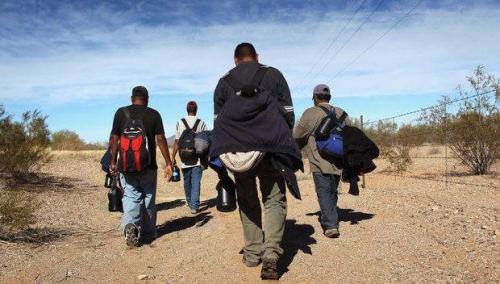Migrants: the exiles of the world and indifference to human life
- Opinión

Oscar Martínez, and his almost two-year-old daughter Valeria, not only died trying to cross the Rio Grande and fleeing El Salvador ... They were also killed by their country of origin, which only had poverty and violence to offer ... and also indifference in Mexico and, especially, the racism and xenophobia of the United States government ...
Migration, a phenomenon of globalization?
One of the consequences of the economic and political restructuring processes that globalization implied was the increase in the precariousness of the living conditions of a large part of the world's population. Far from a promised inclusion and widespread bonanza, these free market and regional integration processes only propitiated the growth / concentration of wealth in a few hands and accentuated a series of generalized problems: inequality increased markedly, poverty grew dramatically, the dispossession and interventionism of the countries of the global north over the territories and peoples of the south continues. In this context, poverty, violence (military and diverse conflicts) and dispossession have produced an increase in the number of migrants (which is around 260 million according to UNHCR). Likewise, the numbers of forced migrants and refugees (which are now more than 60 million) have skyrocketed, and the number of deaths and disappearances has also increased (according to IOM from 2014 to 2018, more than 32 thousand migrants died, of which about 1600 were children). By 2019, the deadliest zone continues to be the Mediterranean, and, secondly, the Mexico United States (US) border.
Particularly and from 2014 to 2018, on the US-Mexico border, the number of dead migrants was estimated at about 1900 (a good part of which originated in the Northern Triangle of Central America). And, from 1998 to date, and according to data from the US border patrol, the annual number of dead migrants is more than 250 (and in several years it is much higher than that figure).
Central American migrants, stories of violence and indifference
The forced migration of Central Americans in transit through Mexico is one of the largest, most precarious and dangerous in the world. According to UNHCR for 2015, and in the following years, it was estimated at half a million people. Also, the number of deaths, attacks and disappearances is considerable. In recent weeks, five minors died in US detention centers. And recently, last June, Oscar Martínez and his little daughter Valeria lost their lives in Rio Bravo, trying to enter the US. The risks that these migrants run have multiple causes (poverty, violence, natural disasters), and, as a great common denominator, the structural indifference to the value of these people's lives, both in their countries of origin, and in Mexico and, especially in the US.
In their places of origin, governments do not offer indispensable conditions of existence (jobs, well-paid wages, social rights), nor security (against gangs and organized crime). They ignore future migrants and leave them to their fate. In Mexico, they suffer multiple attacks by crime groups and some security forces and are seen as criminals by authorities. Finally, in the US, they are treated as highly dangerous criminals and transgressors of the law.
Far from these xenophobic practices and policies (and violations of human rights), migrants are people fleeing from adversity and the only thing they are looking for is the opportunity for a decent and basic life. Criminalizing migrants only exposes them to more risks and aggressions, and constitutes an act of structural and institutional violence.
- Guillermo Castillo is a professor at UNAM, Mexico.
Del mismo autor
- Forced internal displacement in Mexico and processes of violence 13/03/2022
- Labor struggles against precarious work and agribusiness exploitation 09/01/2022
- Detentions, deportations, and criminalization of migrants 29/11/2021
- México: detenciones, deportaciones y criminalización de los migrantes 15/11/2021
- Visibility of migrant voices and subjects 18/10/2021
- La decolonialidad y el abordaje de las movilidades humanas transfronterizas 01/10/2021
- Migrants, social organizations, and policies to control cross-border mobility 20/09/2021
- Decoloniality and sense of the production of social knowledge 06/09/2021
- Decolonialidad y sentido de la producción de conocimiento social 26/08/2021
- México: migrantes, organizaciones sociales y políticas del control de las movilidades transfronterizas 09/08/2021








